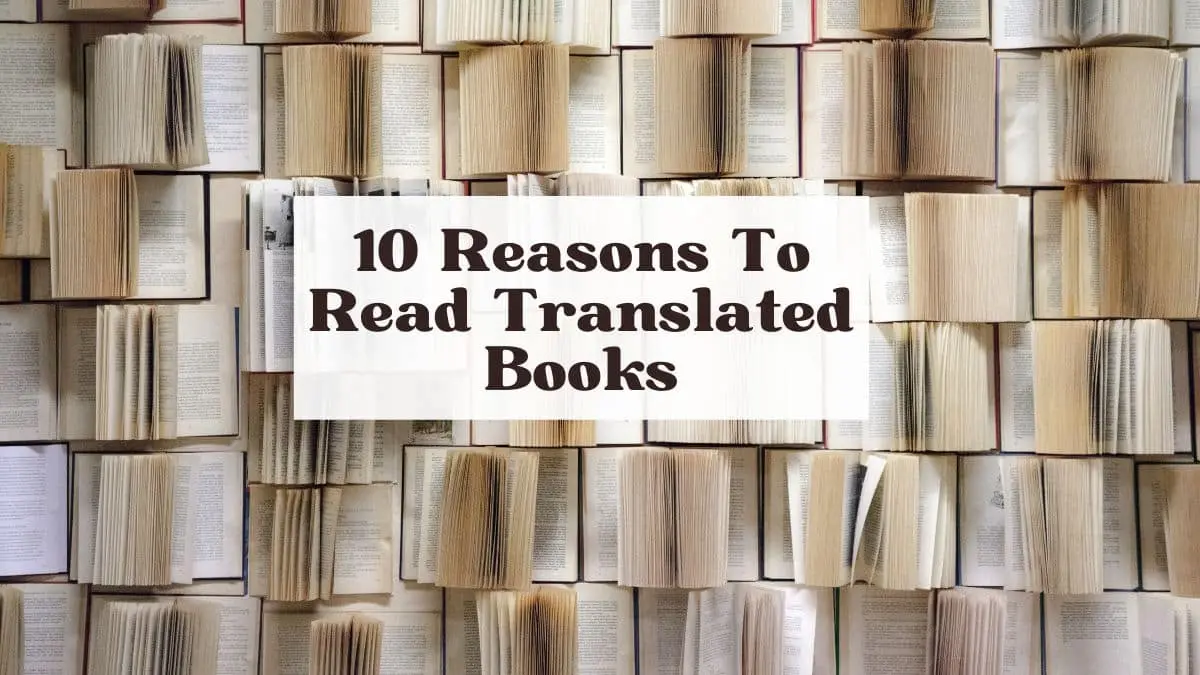In our globalized world, reading books translated from other languages is like having a passport to a myriad of cultures, experiences, and perspectives. If you’ve ever wondered why you should pick up a translated work, here are 10 Reasons To Read Translated Books:
10 Reasons To Read Translated Books
Cultural Insight

When you read a book translated from another language, you’re not just absorbing a story; you’re immersing yourself in the cultural fabric of another society.
These Books provide authentic insights into customs, traditions, and the daily life of people from a different part of the world. You learn about what they celebrate, how they interact, and what matters to them. It’s a learning experience that goes beyond the mere narrative, offering you a vivid picture of life in another culture.
Diverse Perspectives
Translated literature is a gateway to diverse mental landscapes. Every culture has its unique way of storytelling, reflecting its values, humor, and outlook on life. By reading translations, you’re exposed to these varied perspectives, which can challenge and expand your own thinking.
It’s about seeing the world through different eyes – understanding how others confront love, grief, joy, and adversity. This not only broadens your intellectual horizon but also fosters a global mindset. You start to appreciate the commonalities and differences among people, realizing the myriad ways life can be perceived and experienced.
Literary Richness
The global literary landscape is vast and varied. Many of the greatest works in human history were written in languages other than English. From the haunting beauty of Russian classics by Dostoevsky and Tolstoy to the magical realism of Gabriel García Márquez, and the poignant narratives of Murakami, these works have shaped the literary world.
Translations allow you to experience the stylistic nuances, narrative structures, and poetic beauty that are unique to each language and author. They enrich your reading experience, offering a taste of the literary feast that exists beyond your native tongue.
Language Learning

For those learning a new language, reading translated literature can be a powerful tool. It provides context and cultural background that can make language learning more engaging and meaningful.
As you encounter phrases, idioms, and expressions, you gain insights into how the language is used in different contexts. It’s one thing to study grammar and vocabulary, but seeing them come to life in stories adds depth to your understanding. Moreover, you can often find books in both the original and translated language, allowing you to compare and enhance your learning.
Empathy and Understanding
Reading about the lives of others, especially those from different cultural backgrounds, fosters empathy. When you step into the shoes of a character from another part of the world, you begin to understand their joys, struggles, and fears.
This journey through literature humanizes the experiences of others, making you more sensitive to the realities that people face globally. It’s a powerful reminder of our shared humanity, despite cultural or geographical differences. This empathy extends beyond the pages of the book; it influences how you interact with others in the real world.
Historical Context
Many translated works are not only stories but also reflections of their time. They offer historical insights into the country of origin, providing readers with a deeper understanding of that nation’s past and its impact on the present.
Through these narratives, you learn about historical events, social movements, and political upheavals from an insider’s perspective. This can be particularly enlightening for understanding current global issues, as history often shapes the contemporary world.
Enhanced Imagination

Translated books are a feast for the imagination. They transport you to places you’ve never been, introduce you to characters you’ve never met, and expose you to ideas you’ve never considered. This exposure to diverse settings and scenarios expands your imaginative capacity.
Each new book is an opportunity to explore unfamiliar landscapes, whether the bustling streets of a foreign city or the quiet intensity of a rural village. You’ll encounter scenarios that defy your expectations and challenge your preconceptions, pushing the boundaries of your imagination.
Breaking Stereotypes
Translated literature often challenges stereotypes by presenting complex characters and societies. Instead of one-dimensional representations, you get to understand the diversity and complexity of different cultures. This is crucial in an age where stereotypes are often perpetuated by media and popular culture.
By presenting nuanced portrayals of life in other countries, translated books help dismantle these stereotypes, promoting a more accurate and respectful understanding of the world. This is not only important for personal development but also for fostering a more inclusive and understanding society.
Support for Global Voices
Choosing translated books supports translators, authors, and publishers who bring these works to a global audience. Many of these individuals and institutions work tirelessly to ensure that voices from around the world are heard and appreciated.
By reading their work, you’re contributing to a more diverse and inclusive literary landscape. You’re helping to ensure that stories from all corners of the globe have the chance to be told and that the literary canon continues to grow and evolve. This support is crucial for maintaining a vibrant, diverse, and dynamic literary ecosystem, where a multitude of voices can flourish and be appreciated.
Personal Growth

Lastly, reading translated literature encourages personal growth. It pushes you out of your literary comfort zone, challenging your preconceptions and expanding your understanding of the world. This can be an intellectually stimulating and emotionally rewarding experience.
You develop a more well-rounded worldview, become more culturally aware, and enhance your critical thinking skills. Moreover, the challenges of understanding complex concepts or unfamiliar cultural references can be intellectually invigorating, fostering a love for learning and exploration.
Also Read: Reasons Marvel’s Spider-Man 2 Might Not Be 2023’s Game of the Year



